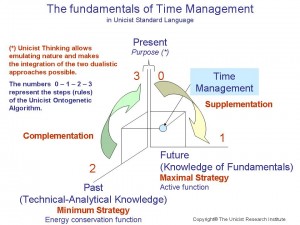Future can only be managed knowing the fundamentals that rule it. The Unicist Standard was developed to influence reality in order to make a “future” happen.
 The “future” (fundamentals) drives action and the “past” (technical analytical knowledge) sustains the energy conservation.
The “future” (fundamentals) drives action and the “past” (technical analytical knowledge) sustains the energy conservation.
Maximal strategies are driven by the knowledge of fundamentals and minimum strategies are sustained by the technical analytical knowledge.
Future scenarios, diagnoses, strategies and business organization are typical activities that deal with the future. As past and future are not symmetric, a different result can only be achieved if the fundamentals are managed.
Fundamentals are, by definition, the functional description of the essences (the nature) of a specific reality and require an extreme effort of abstraction in order to “grasp” them.
This abstraction is what we call unicist reflection which is necessary to apprehend the nature of something. The core of the reflection process is the confirmation of the hypothetical fundamentals with the necessary “pilot tests” which are real actions in the environment.
The Unicist Standard implies managing the fundamentals of reality to influence the future and having the necessary technical-analytical knowledge to deal with the present based on the past.
It all begins with the knowledge of the fundamentals to find out if the desired future is possible. This is an extreme abstraction effort to deal with a non-symmetric solution.
Only those who need to influence the future in their environment need to deal with fundamental analysis. This is a precondition to manage the Unicist Standard.
Those who are used to working with the “benchmarks” of the past are threatened by this technology. They cannot deal with the innovation that is implicit in the future.
